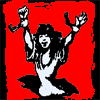 Home: Blog: 2006-02-10 Revolution 101
Home: Blog: 2006-02-10 Revolution 101 Home: Blog: 2006-02-10 Revolution 101
Home: Blog: 2006-02-10 Revolution 101Political power grows out of the barrel of a gun.
Mao Tse-Tung
Have you ever wondered what government actually is?
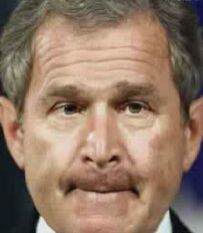 Most powerful root vegetable in the worldIs it just a subjective human convention: whoever we call the government is therefore the government? Or is it a group of people who have an objective, legitimate right to rule us?
Most powerful root vegetable in the worldIs it just a subjective human convention: whoever we call the government is therefore the government? Or is it a group of people who have an objective, legitimate right to rule us?
Let's pick a simple example, and they don't come much simpler than vast human potato George W. Bush, President of the United States of America. Let's face it, in ordinary life, George's pronouncements - I know the human being and fish can coexist peacefully, for example - would probably not form the basis of social policy. So why is he given important decisions to take about war and the environment, rather than (say) serving our woefully understaffed human draft excluder industry?
Is it perhaps because he is granted authority under the US Constitution? The problem with this answer is that it simply generates another question. From where does the authority of the US Constitution itself come? After all, it didn't always exist. The founding states of the USA were once British colonies, and government then was done in the name of King George III of England. How did the authority of the King come to be replaced by the authority of the US Constitution?
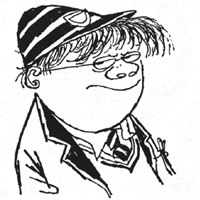 Molesworth: natural revolutionary heroWith apologies to the schoolboy hero Molesworth, as any fule kno, this happened when American independence was recognised in the Treaty of Paris of 1783, signed, in order to avoid having to change the name, in Paris in 1783. This bore the names of David Hartley MP, signing on behalf of an extremely annoyed King, and Benjamin Franklin, who grinned alot, not realising he would eventually be succeeded by a man who would one day announce I think we agree, the past is over.
Molesworth: natural revolutionary heroWith apologies to the schoolboy hero Molesworth, as any fule kno, this happened when American independence was recognised in the Treaty of Paris of 1783, signed, in order to avoid having to change the name, in Paris in 1783. This bore the names of David Hartley MP, signing on behalf of an extremely annoyed King, and Benjamin Franklin, who grinned alot, not realising he would eventually be succeeded by a man who would one day announce I think we agree, the past is over.
But again, why? Why did the King sign a treaty less palatable to a British monarch than a corgiburger? And now, finally, our string of questions brings us to the real basis of the President's power:
It's clearly a budget. It's got a lot of numbers in it.
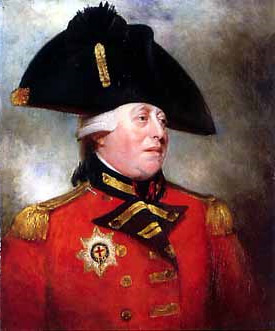 King George III: annoyedSorry, actually that was another Bushism. Erm, oh yes, the real basis of the President's power:
King George III: annoyedSorry, actually that was another Bushism. Erm, oh yes, the real basis of the President's power:
The American War of Independence
In other words, the King lost power over the American states because his armies controlling them were defeated by the Americans (with a bit of help from the French, and the Dutch, who were delighted to see England's power diminished). The Treaty didn't hand over power, it merely recognised that power had already been seized by one army from another.
Only once the states were under the control of an army loyal to them could the American founding fathers agree their Constitution, and only then could the Constitution grant power to a President, and only then could President George W. Bush become the most powerful root vegetable in the world.
In short, power is not given to governments under law or by right, but taken by governments through force of arms: and then maintained through those same arms.
ALL GOVERNMENT IS RULE BACKED BY THE THREAT OF FORCE
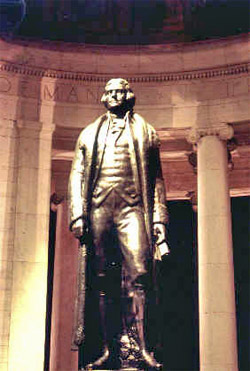 Thomas Jefferson: half rightNow, I can imagine half my readers in fury: so that would be roughly six of you. This is all cynical lefty nonsense, I hear you cry: what of the people! As Thomas Jefferson put it: the will of the people is the only legitimate foundation of any government.
Thomas Jefferson: half rightNow, I can imagine half my readers in fury: so that would be roughly six of you. This is all cynical lefty nonsense, I hear you cry: what of the people! As Thomas Jefferson put it: the will of the people is the only legitimate foundation of any government.
But read his words carefully: he says not that the people's will is the only foundation of government, but that it is the only legitimate foundation of government. It was clear to Tom, as on reflection it must be clear to even to the likes of George W. Bush (Wow! Brazil is big!), that the world is heaving with governments which are quite clearly governments, and equally clearly don't give a damn about the will of the people.
Let's leave the USA behind this time and go for a seriously big country, like China. Every day, the Chinese government ignores the will of more people simultaneously than any other government in the history of the world. This is a Guinness Book of Records standard peoples-will-ignoring. Not a legimitate government? Bloody right. But most definitely a government.
But the government of the USA is based on the will of the people, isn't it? As George W. Bush rousingly put it: We stand for things!
The answer to this question is no.
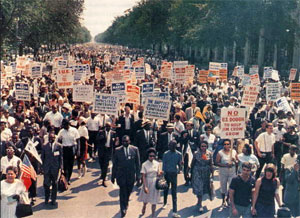 The march on Washington
The march on Washington
The people, not the founding fathers, won America's freedomsDo not misunderstand me. The people of the USA are a quantum leap ahead of the people in China in the rights they enjoy. These were not, incidentally, granted to them for all time by the wisdom of a few founding fathers, or bestowed on them through the generosity of a liberal government. Like independence itself, they were won through the bitter struggle of the people: first against the armies of the British monarchy, but then against their own ruling class. The abolition of slavery, the struggle for civil rights, the abolition of property qualifications for the vote, the extension of voting rights to women, and then to black people, the right to form unions: none of these rights were born with the Union, they all had to be won by its people. The Chinese people at the time of the revolution were largely divided and poorly educated peasant farmers, rather than industrial workers like the Americans, and simply didn't have the same unity or the same power to win reforms from government - though that is changing.
But ultimately, the very purpose of government is to subvert the will of the people. Think about it. Would the great mass of people really choose to labour to produce profits for others while they barely made enough to run their own lives? Would they choose to build corporate offices by day so that they might sleep in overcrowded tenements by night?
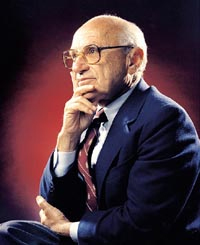 Milton Friedman: talked bollocksOh, I am aware that there are economists who present sophistical arguments demonstrating that this kind of inequality in society is, in the long run, for the good of all of us. They're talking bollocks, of course, but I don't ask you to accept that for the purpose of this argument. I only ask this: are we really saying that the ordinary working (and non-working) people of the United States have said to themselves "Yep: reckon capitalism and tight monetary control are the way to go, and if that means I'm out of a job and my kids have no healthcare, well, that's economics for you"? Or, if I can put the same question another way, are you on drugs?
Milton Friedman: talked bollocksOh, I am aware that there are economists who present sophistical arguments demonstrating that this kind of inequality in society is, in the long run, for the good of all of us. They're talking bollocks, of course, but I don't ask you to accept that for the purpose of this argument. I only ask this: are we really saying that the ordinary working (and non-working) people of the United States have said to themselves "Yep: reckon capitalism and tight monetary control are the way to go, and if that means I'm out of a job and my kids have no healthcare, well, that's economics for you"? Or, if I can put the same question another way, are you on drugs?
In order to genuinely believe that the society of the United States of America represents the society that its people want, you would have to be the kind of person who might also join a certain well known President in speculating that: Maybe some will run for office and say, 'Vote for me, I look forward to blowing up America!'
ALL GOVERNMENT EXISTS TO SUBVERT THE WILL OF THE PEOPLE
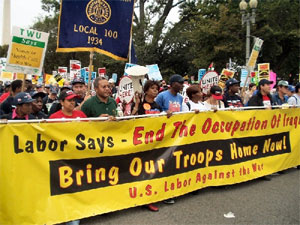 US labour: conspicuously NOT the decision makers.So, who does government serve?
US labour: conspicuously NOT the decision makers.So, who does government serve?
It stands to reason that those who rule will structure society in their own interests. Therefore, by observing in whose interests society is structured, we can learn who is ruling. So: who sounds as though they probably like the way the USA is governed?
a) The poor, the workers who labour at alienating jobs to earn an inadequate wage to fail to give their families the security they need, the people with cripplingly expensive healthcare insurance, or no healthcare at all, the parents of children sent out by run-down schools into communities without employment or the waiting arms of the military recruiters to be turned into targets for people they have never met and have no quarrel with abroad...
...or...
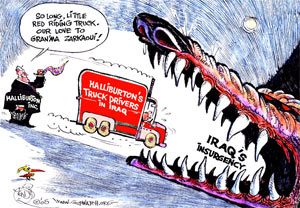 After the US sent their soldiers in to conquer (and be killed)
After the US sent their soldiers in to conquer (and be killed)
Halliburton sent their workers in to profit (and be killed)b) The rich, privelidged owners of the private corporations, and their friends in the leading ranks of the established political parties, the top echelons of the civil service, and the senior military officers sending young men to their deaths?
Concentrate George...
I'm honored to shake the hand of a brave Iraqi citizen who had his hand cut off by Saddam Hussein.
Erm, well... actually the correct answer was (b).
But given that there are so many of (a), and so few of (b), how do (b) maintain their rule in a democracy?
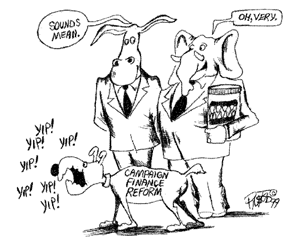 Republicans and Democrats: spot the differenceAmerica's free electoral system reflects the interests of the people who pay for it: the corporations without whose funding, and the media without whose support, no political candidate has any hope of election to anything. American government is open to anyone in the same way that the Warldorf Hotel is open to anyone: though strangely the only people you ever see in either are wealthy, suited, and peculiarly inclined to business friendly politics.
Republicans and Democrats: spot the differenceAmerica's free electoral system reflects the interests of the people who pay for it: the corporations without whose funding, and the media without whose support, no political candidate has any hope of election to anything. American government is open to anyone in the same way that the Warldorf Hotel is open to anyone: though strangely the only people you ever see in either are wealthy, suited, and peculiarly inclined to business friendly politics.
This bias in the electoral system has been widely recognised, and there are those who believe that by careful reform, these imbalances and imperfections can be smoothed out. Limits on political donations, the regulation of political advertising, state funding of political parties..., a programme of reform might yet offer real democratic rule, and avoid electing a President who makes announcements such as I can only speak to myself. Further, it might be objected that not all the world's democracies are as dominated by big budget campaign funding as that of the US.
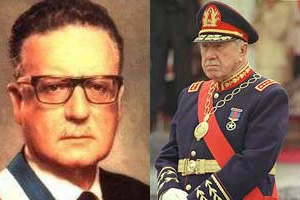 Elected Chilean President Salvador Allende (left), for threatening
Elected Chilean President Salvador Allende (left), for threatening
the interests of the ruling class, undermined by the CIA
and overthrown in a coup by General Augusto Pinochet (right)But the problem cannot be solved through electoral reform, because it is not created by an imperfect voting system, but by minority rule. Ultimately, should any electoral system create an administration which represented a genuine threat to the power of the ruling class, it would be swept away by the same army which put the minority class into power in the first place, as happened in Italy in the 1920's, in Spain and Germany in the 1930's, in Chile in the 1970's...
The role of government is to preserve the power of the ruling class, not to implement the will of the people, so...
DEMOCRATIC GOVERNMENT IS A CONTRADICTION IN TERMS
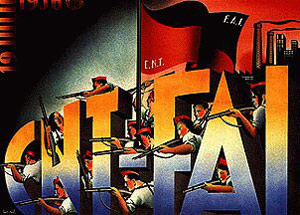 Anarchist Confederacion Nacional del Trabajo
Anarchist Confederacion Nacional del Trabajo
(National Confederation of Labour)
poster from the Spanish Civil WarIf democratic government is impossible, what kind of government should we have?
The answer is essentially simple: you don't need a government to impose the people's will.
Human history has been the story of governments, because human history has been the story of the rule of the minority over the majority. That can only be maintained through government: through laws enforcing privelidge, themselves enforced by men with guns. But overthrow minority rule and you overthrow the need for government with it.
It is not the overthrow of a government, but the overthrow of all government, which is revolutionary.
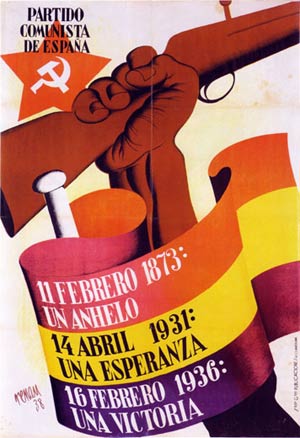 Civil war poster of the Stalinist Partido Comunista de Espana
Civil war poster of the Stalinist Partido Comunista de Espana
(Communist Party of Spain): more interesting in defeating
Trotskyists than FascistsIn modern times, only two movements have offered any prospect of such a revolution: socialism and anarchism.
Socialists and anarchists agree that the state is the weapon by which a minority class, a ruling class, maintains its rule. They agree that this state must be destroyed. They agree that the power to destroy it lies in the hands of the oppressed majority. They even agree that the proper future for mankind is a future without government.
They do disagree on two points, however.
Most socialists believe that revolution requires leaders: a group of the most politically conscious to inspire and guide others, a revolutionary party. Most anarchists believe that they do not, and that such groups at best show arrogance, and at worst are just new dictators in waiting.
Most socialists believe that after a revolution, we will still need a state to defend against counter-revolution at home or from abroad, but that this will gradually wither away through disuse in a world without classes and therefore without conflicting class interests. Most anarchists believe that the aim of revolution should be the immediate abolition of the state.
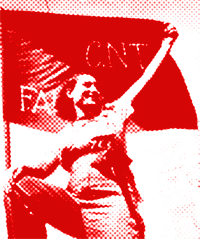 Until very recently, I would have sided with the socialists on both these questions. I now think I was wrong. Those who offer themselves as the vanguard of the working class have more frequently held that class back rather than leading it forward: from the huge betrayal of the Spanish revolution in the 1930's, to its pathetic echo in the betrayal of the British working class by the largest British 'vanguard', the Socialist Workers Party, right now. Similarly, the bureaucratic centralism of the revolutionary socialist groups, translated into a 'revolutionary state', is a gift to any future dictator. Though the danger was clearly signposted by both the anarchist Bakunin and the socialist Rosa Luxemburg, Lenin's centralised party provided the perfect mechanism for the dictatorship of Joseph Stalin.
Until very recently, I would have sided with the socialists on both these questions. I now think I was wrong. Those who offer themselves as the vanguard of the working class have more frequently held that class back rather than leading it forward: from the huge betrayal of the Spanish revolution in the 1930's, to its pathetic echo in the betrayal of the British working class by the largest British 'vanguard', the Socialist Workers Party, right now. Similarly, the bureaucratic centralism of the revolutionary socialist groups, translated into a 'revolutionary state', is a gift to any future dictator. Though the danger was clearly signposted by both the anarchist Bakunin and the socialist Rosa Luxemburg, Lenin's centralised party provided the perfect mechanism for the dictatorship of Joseph Stalin.
The key point, however, is that government is not an intrinsic human need. It exists to shape society in the interests of a minority. Eliminate minority privilege, and you can eliminate government. Eliminate government, and you free people to shape society in their own interests.
As the sadly not late President George W. Bush put it: Justice ought to be fair, and:
A JUST SOCIETY NEEDS NO GOVERNMENT
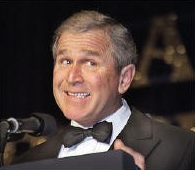 Manny Neira
Manny Neira
with thanks to the President of the United States of America